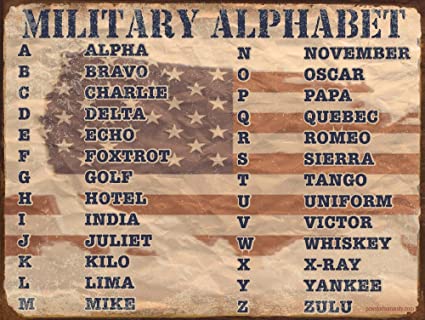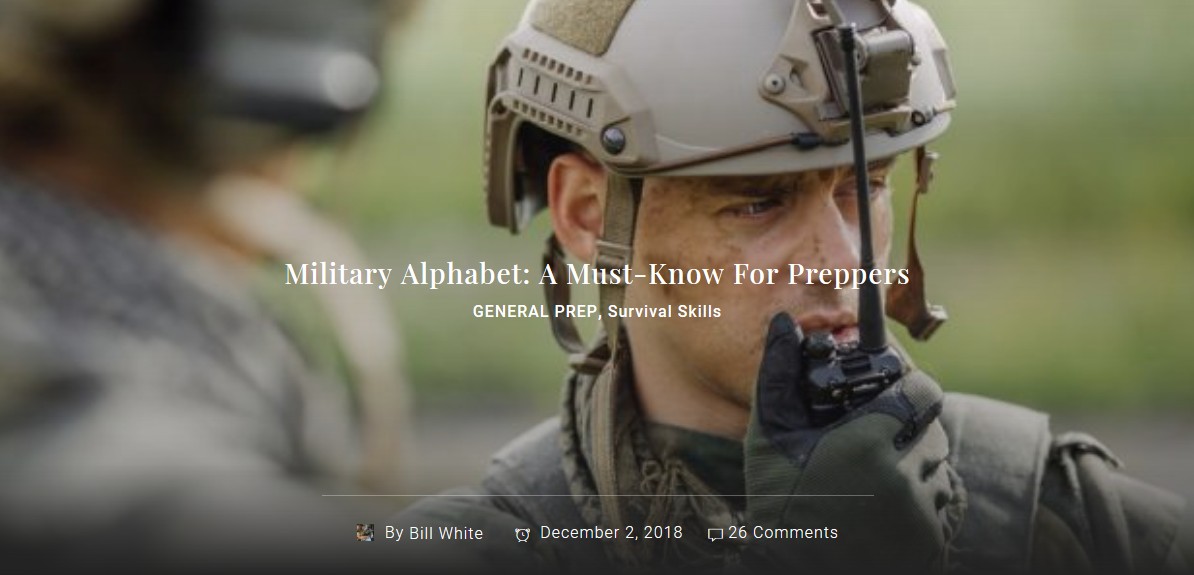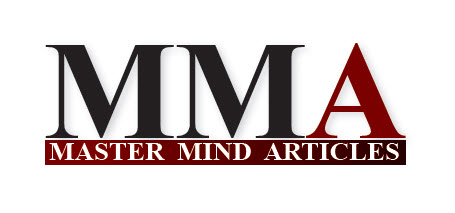✊ Know the Code from the Field of Master Mind Survival (MMSUR) 👥
Shared from the research of: Joseph Mercado 👨
Article Author: Bill White 👴
Content Contributor: Survivopedia 🌎
To: Survivalist 🔨
Blog Post #1088 📌
Re: Understanding the Military Alphabet 🔡
Date and Time: Sunday, November 22, 2020 at 9:27 a.m. ⏰
Dear Survivalist,
We in the prepping and survival community have stolen much from the military.
That makes sense, if you think about it. On an individual basis, combat is the ultimate game of survival (although it’s not a game).
Why reinvent the wheel, when there is so much that the military does, which we can use?
That’s not to say that everything the military does is perfect for our needs.
Military equipment tends to be over-designed, so that it can withstand the strain of rough use by people who have more important things to think about than taking care of their equipment.
That tends to make it heavy and bulky, often too heavy for our needs.
Even so, there is much that we can learn from our armed forces and much which can be adapted to our needs.
A lot of this is the methodologies that soldiers use, whether in combat or in their barracks. One of these areas we can learn from is the military alphabet.
The Phonetic Alphabet:
Have you ever tried to spell out a complicated name for someone else?
How about doing that over a poor telephone connection? Those who have unusual names know what I’m talking about; they’re stuck doing it all the time.
They also have to put up with other people’s misspellings and mispronunciations all the time as well.
This problem doesn’t exist in the military, especially between communications specialists.
That’s because they use the Phonetic Alphabet, often referred to as the Military Alphabet.
In this alphabet each letter is assigned an easily recognizable word which starts with that letter.
This alphabet, is actually not the first version that the military has used.
The history of these alphabets goes back to before World War I.
The current iteration has remained relatively unchanged since 1956, although there have been spelling changes made to it as recently as 2008.
One of the reasons for this has been that since World War II, the need was seen for an internationally recognized phonetic alphabet for military forces to use, which would be understood by all allied forces.
The birth of the US Army Air Corps increased the need for a unified phonetic alphabet as pilots often have to convey critical information, while flying in a noisy airplane cockpit.
Even with the use of headphones, it was easy for communications to become garbled.
By adopting the phonetic alphabet, pilots could communicate with each other, their control towers and ground forces they were supporting, without the errors that had been common beforehand.
While the phonetic alphabet may seem extremely simple, it is not. Countless hours of research has gone into selecting the words which are currently used.
The key criteria for this was that they would be easily recognizable, regardless of what sort of English was spoken and what sort of accent the speaker had.
The same understanding had to exist, regardless of whether the person spoke British English with a Cockney accent, sounded like they came from Down Under or spoke Midwestern American English.
The current iteration of this alphabet is called the International Code of Signals for Visual, Sound, and Radio Communications or more simply ICAO.
It also includes numerals and some basic punctuation, which pretty much follow the same pronunciation that you and I use every day, with the exception of the period, which is referred to as a “full stop.”
While universally adopted by military forces, this version of the phonetic alphabet is not the one used by law enforcement, although most law enforcement officers will understand it.
Their version differs in several details, so if you are communicating with a LEO, don’t be surprised if they substitute other words for the ones on that chart.
Using the Phonetic Alphabet:
Obviously, it is slower to speak with this phonetic alphabet, than it is to speak normally. So it makes absolutely no sense to try and use it for all conversation. Rather, it is only used when necessary to avoid confusion. Some such examples might be:
- Giving map coordinates or directions
- Transmitting something in code
- Spelling the name of a person or location
- Ordering material by catalog number
When it is necessary to transmit this type of information by voice communications, the normal format is to say the word, spell it out with the phonetic alphabet and then continue on with the conversation. If there is a lot of noise or static, the phonetic spelling might be repeated:
“General Discussion’s unit, I spell Delta – India – Sierra – Charlie – Uniform – Sierra – Sierra – India – Oscar – November, is just over the hill.”
For those who know the phonetic alphabet, there is no possibility of misunderstanding this message. So, what the phonetic alphabet lacks in speed, it makes up for in clarity; and that’s its true purpose anyway.
Miscommunications can be disastrous in warfare, causing things like blue on blue fire.
This method helps eliminate those disasters, by providing a means of accurate communications.
Using the Phonetic Alphabet in Survival:
While there may not seem like much use for the phonetic alphabet in survival, there are a number of situations where it could be extremely useful, especially when trying to transmit something in code.
All radio communications made by your survival team should be in some sort of code, even if you are just using deceptive descriptions and names of people, places and things.
You don’t need to be giving information away to potentially hostile forces.
Nor do you need to have miscommunications between your own team, because of noise or unclear radio contact.
The phonetic alphabet will help eliminate this.
Probably the most important use of the phonetic alphabet for a survival team is in giving directions to team members.
Such directions are one of the easiest things to mis-communicate, especially if they contain names which are not known by the receiving party.
Spelling the names of streets and other landmarks phonetically will ensure that they receive the message clearly.
Another way that this could be useful to a survival team is to use it for conveying information about supplies.
If you develop a simple code, with letter codes, such as “LVD,” for each supply item, then using the phonetic alphabet allows a scavenger team in the field to call back to base and report on what they’ve found, while still keeping that information secret.
Finally, learning the phonetic alphabet will keep others from using that information against you.
It is actually rather easy to learn, if you just find a way to use it in your everyday life. Once you’ve learned it, you’ll probably never forget.
I still remember it, and I learned it 40 year ago.

Written by Bill White:
Bill White is the author of Conquering the Coming Collapse, and a former Army officer, manufacturing engineer and business manager.
More recently, he left the business world to work as a cross-cultural missionary on the Mexico border.
Bill has been a survivalist since the 1970s, when the nation was in the latter days of the Cold War.
He had determined to head into the Colorado Rockies, should Washington ever decide to push the button.
While those days have passed, the knowledge Bill gained during that time hasn’t.
He now works to educate others on the risks that exist in our society and how to prepare to meet them.
Content Source: Survivopedia.com 🌍

 Email Us a Message
Email Us a Message 

Please send us a personal message below and we will serve you momentarily.
We appreciate you visiting the MMU Global Research Directory
For more blog posts, videos, articles, and to generate more knowledge, please feel free and…






 Fly Over to the MMU Facebook Page with Hoot
Fly Over to the MMU Facebook Page with Hoot 
 Join the MMA Facebook Group Today
Join the MMA Facebook Group Today 